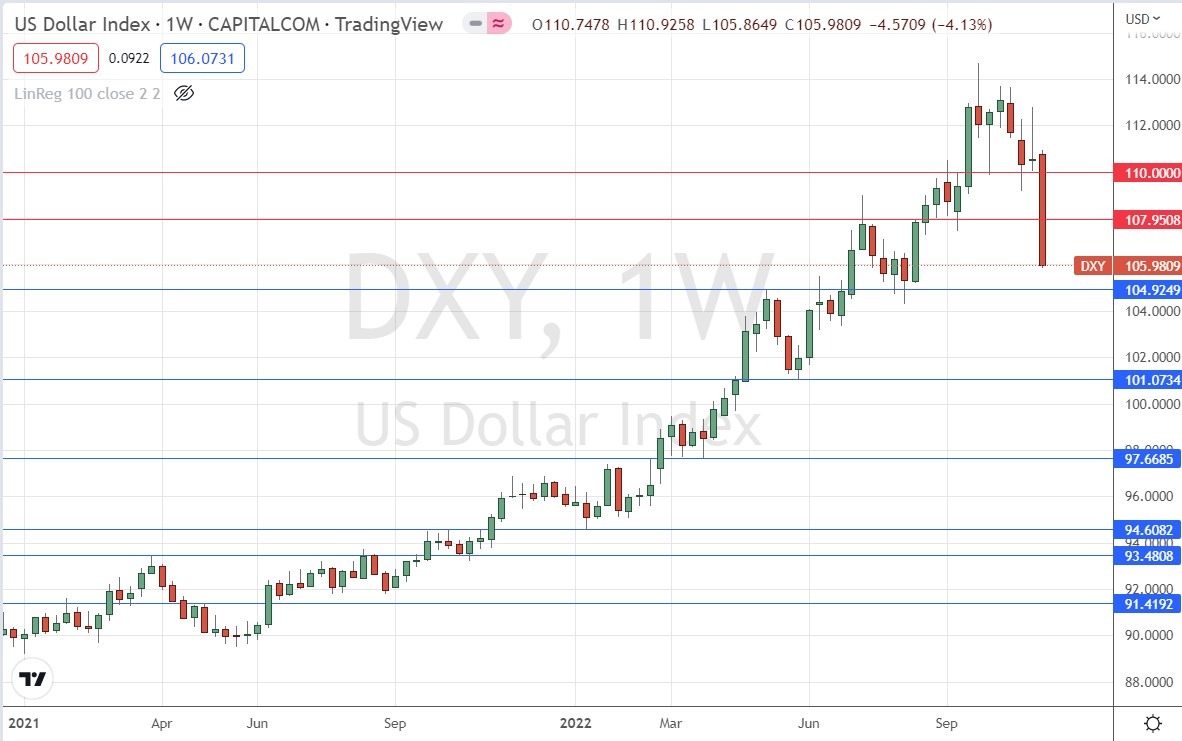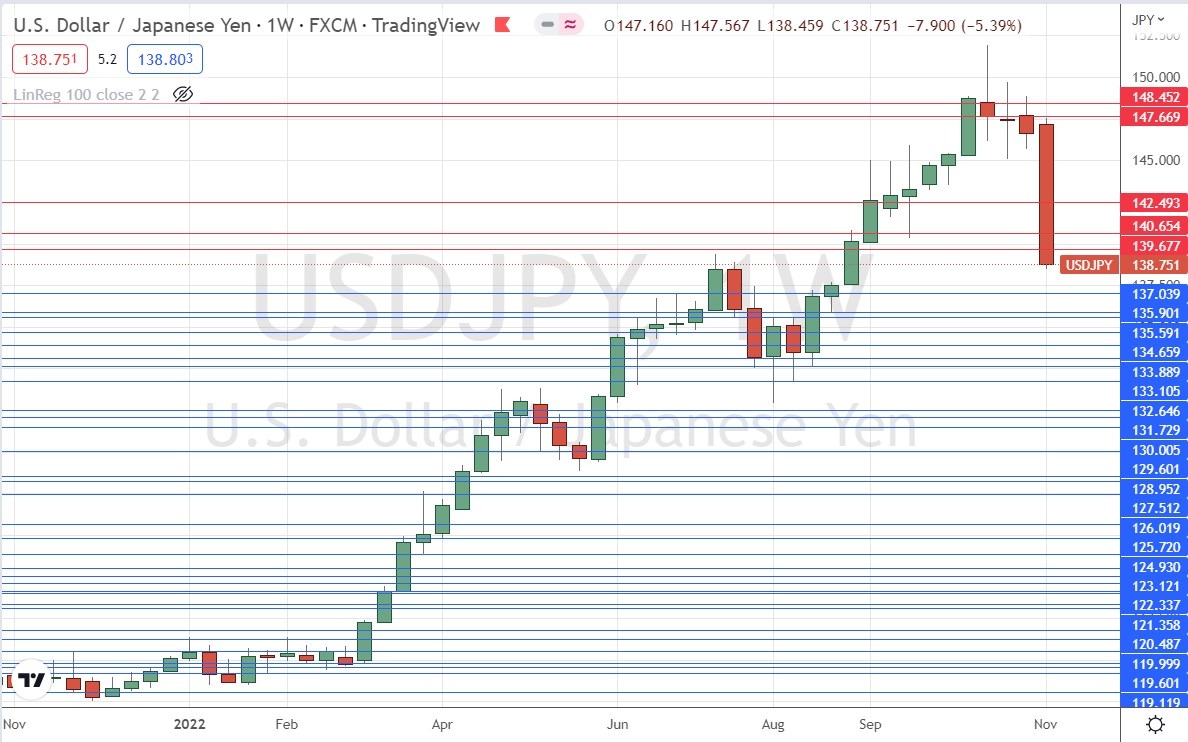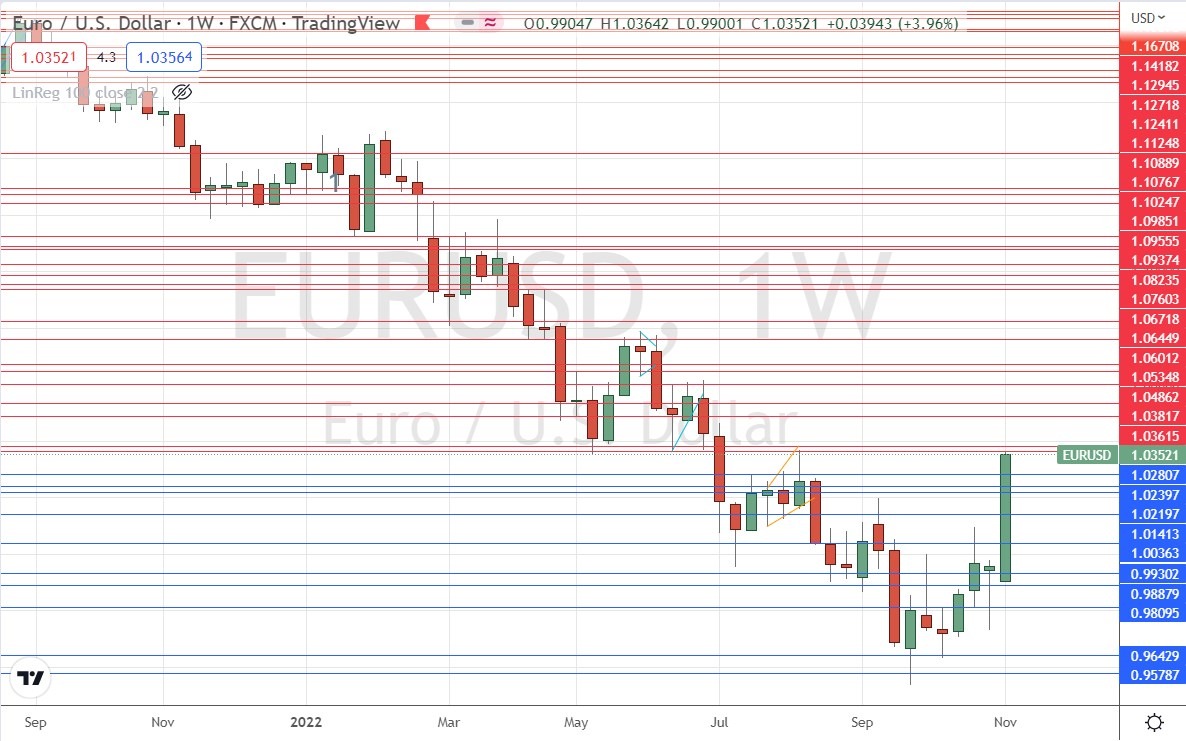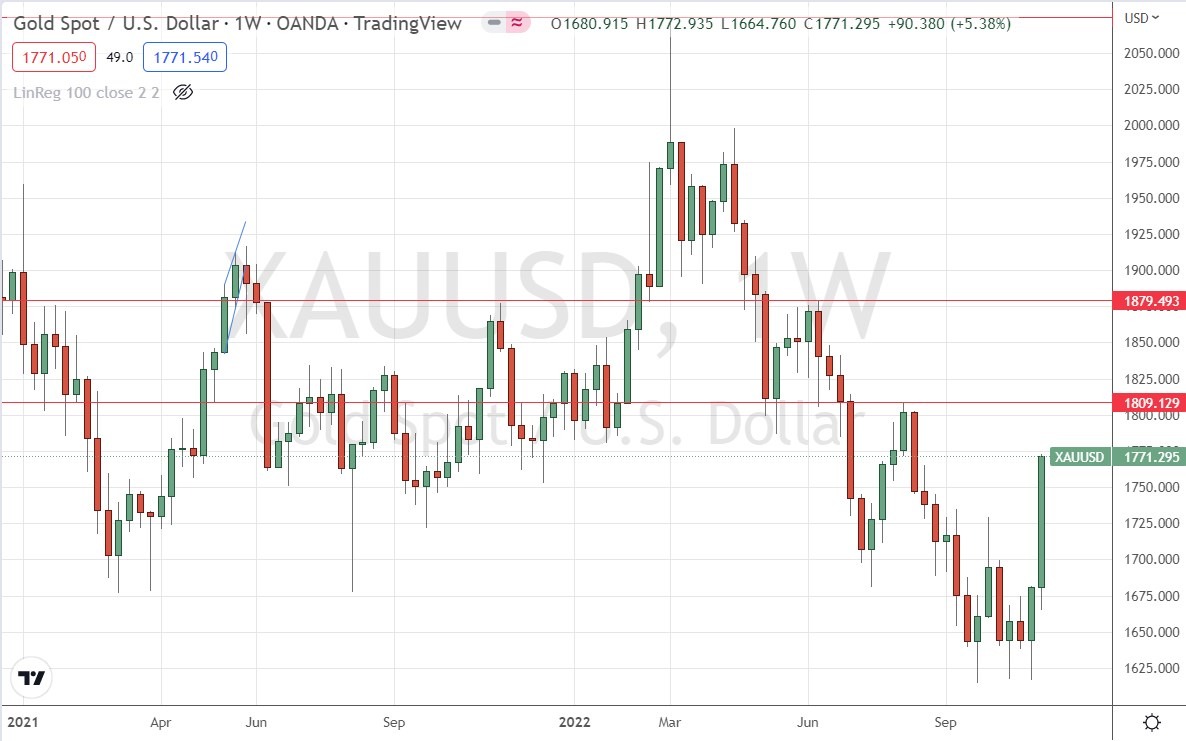The past week has seen a very strong reversal in the Forex market, with the US Dollar selling off heavily, and stock markets rising firmly, as US inflation data finally begins to show a meaningful decline.
The difference between success and failure in Forex / CFD trading is highly likely to depend mostly upon which assets you choose to trade each week and in which direction, and not on the exact methods you might use to determine trade entries and exits.
So, when starting the week, it is a good idea to look at the big picture of what is developing in the market as a whole, and how such developments and affected by macro fundamentals, technical factors, and market sentiment. There are some strong short-term trends in the market right now, which might be exploited profitably. Read on to get my weekly analysis below.
Fundamental Analysis & Market Sentiment
I wrote in my previous piece on 6th November that the best trades for the week were likely to be making short-term trades long of the CAD and the NZD. This was a good call as both currencies rose over the week.
The news is currently dominated by last week’s stronger-than-expected drop in US inflation data, which saw annualized CPI drop from 8.2% to 7.7%, when a fall to only 8.0% or 7.9% was widely expected. This is the key economic data that markets have been following over recent months as historically high levels of inflation have forced central banks to make a series of strong rate hikes, sending the US Dollar much higher and stock markets sharply lower. Analysts have been waiting for the end of this move, which would logically come when inflation in major economies truly begins to start falling, showing that the tighter monetary policies imposed by central banks seem to be working. This in turn gives hope that central banks can begin to ease up on the tightening, especially the Fed in the USA, which gives more hope in stock markets and deflates the huge recent rate-driven rise in the US Dollar.
This development triggered an unusually strong move in the Forex market over the past few days, with the US Dollar selling off very strongly and other currencies making dramatic gains against it. For example, the USD/JPY currency pair declined by more than 5%, while the EUR/USD currency pair rose by just a fraction less than 4%. Stocks and commodities also got a major boost, with the S&P 500 Index rising by more than 6.5% over the week. However, some institutions are signaling that these rises are over-euphoric, so they may well not be sustained for much longer, and in technical terms, they are very strongly counter trend.
In other major news from the USA, while the Republican party still looks highly likely to regain control of the House of Representatives as last week’s votes are tallied, it has become clear that they have failed to take control of the Senate. This is a boost for the likely success of President Biden’s agenda for the remainder of his term.
The UK released GDP data which showed a worse-than-expected month-on-month decline of 0.6% (a decline of only 0.4% had been expected). However, this has not had much effect on the British Pound which is performing just as strongly as the Euro. A rumor has emerged this weekend that the British government is planning to announce £35 billion in public spending cuts and £20 billion in tax increases. It is extremely likely that the UK will be in a technical recession by the start of 2023.
The final important data release of last week was the US Preliminary UoM Consumer Sentiment which came in lower than expected.
The Forex market saw the greatest strength in Japanese Yen last week, much to the final relief of the Bank of Japan which had been trying to combat excessive Yen weakness over recent weeks and months. The weakest currency was clearly the US Dollar.
Rates of coronavirus infection globally decreased last week, continuing a trend that began 4 months ago. Raw numbers have not been this low since the end of the first wave in the summer of 2021. The only significant growths in new confirmed coronavirus cases overall right now are happening in China and Japan.
The Week Ahead: 14th November – 18th November 2022
The coming week in the markets is likely to see a lower level of volatility, as although there are several major data releases scheduled, none of them are likely to be close to the impact of last week’s US inflation data. The scheduled releases are:
- British CPI (inflation) data
- Canadian CPI (inflation) data
- US PPI data
- US Retail Sales data
- Australian Monetary Policy Meeting Minutes
- British Unemployment data
- US Philly Fed Manufacturing Index
- US Empire State Manufacturing Index
- Australian Wage Price Index
- British Monetary Policy Report Hearings
- Australian Unemployment data
Technical Analysis
U.S. Dollar Index
The weekly price chart below shows the U.S. Dollar Index printed an extremely strong bearish candlestick which closed right on its low. The size of the weekly fall was the largest which has been seen in several years in the US Dollar. The price easily sliced through two former support levels which are now likely to act as resistance if reached.
The long-term bullish trend in the US Dollar is in serious trouble and may well be over as we are now finally seeing inflation numbers which are declining meaningfully, suggesting that the Fed will not be under as much pressure to make further strong rate hikes. This is logically going to bring a lower value for the US Dollar, but higher values for stocks, commodities, and other risky assets.
We may see a short-term bullish retracement in the US Dollar before the price falls much further, as every major US Dollar pair has arrived at an area of likely strong support for the US Dollar but buying the US Dollar in the face of this unusually strong, fundamentally driven short-term momentum looks likely to be very dangerous.
The best trades over the coming week are likely to be either short of the US Dollar or avoiding the greenback entirely.

USD/JPY
Last week saw the USD/JPY currency pair print an exceptionally large bearish candlestick which closed very near the low of its range after easily slicing through several former support levels. The fall was already underway but really got legs after US inflation data came in lower than expected, reducing expectations of a more hawkish fed rate policy. This currency pair had been over-extended against the wishes of the Bank of Japan, which had recently begun intervening to bring the price lower. These factors all helped to contribute towards the abnormally strong price fall we have just seen.
There is very strong bearish momentum here, so it seems quite possible that the price will reach the nearest support level at ¥137.04 over the coming week.

EUR/USD
Last week saw the EUR/USD currency pair print an exceptionally large bullish candlestick which closed very near the high of the weekly range.
The strongly bullish long-term trend in the US Dollar is now likely over, and the Euro is showing high short-term strength.
Although the price was already rising from the recent long-term long before last week, the lower-than-expected US inflation print sent the US Dollar plummeting, which was strongly felt in this currency pair.
Although there seems to be very strong short-term bullish momentum here, bulls should be mindful that this currency pair likes to make retracements within even strong trends, and the price did end last week at what looks likely to be a strong resistance level at about $1.0355, so the price may not be likely to rise further over the short-term.

Gold (XAU/USD)
Last week saw the price of Gold rise very strongly, printing a large bullish candlestick which closed right on its high. This was driven by the unusually strong fall in the US Dollar which was triggered by a long-awaited US inflation print below expectations signaling a meaningful fall.
Despite its common reputation as a safe-haven asset, Gold has a historically positive correlation with the US stock market, so it is not a big surprise that Gold is making gains at the same time as stocks are.
We see firm bullish short-term momentum here, and what makes the price of Gold especially interesting for traders over the coming days is that unlike most major Forex pairs, the price has some way left to rise before reaching an area of key resistance.
It is likely that the price will continue to rise over the coming days to at least the nearest resistance level at $1809.

Bottom Line
I see the best opportunities in the financial markets this week as likely to be making short-term trades short of USD/JPY targeting ¥137.04 and long of XAU/USD targeting $1809.
Ready to trade our Forex weekly analysis? We’ve shortlisted the best Forex trading brokers in the industry for you.
https://news.google.com/__i/rss/rd/articles/CBMidWh0dHBzOi8vd3d3LmRhaWx5Zm9yZXguY29tL2ZvcmV4LXRlY2huaWNhbC1hbmFseXNpcy8yMDIyLzExL3dlZWtseS1mb3JleC1mb3JlY2FzdC0xM3RoLSVFMiU4MCU5My0xOXRoLW5vdmVtYmVyLzE4NzE1M9IBAA?oc=5
2022-11-13 12:14:22Z
CBMidWh0dHBzOi8vd3d3LmRhaWx5Zm9yZXguY29tL2ZvcmV4LXRlY2huaWNhbC1hbmFseXNpcy8yMDIyLzExL3dlZWtseS1mb3JleC1mb3JlY2FzdC0xM3RoLSVFMiU4MCU5My0xOXRoLW5vdmVtYmVyLzE4NzE1M9IBAA
Bagikan Berita Ini















0 Response to "Weekly Forex Forecast – XAU/USD, USD/JPY, EUR/USD - DailyForex.com"
Post a Comment